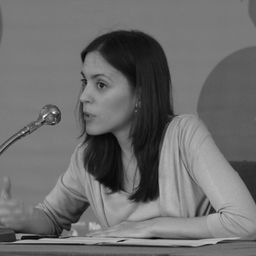
Maria Isabel Alba Dorado
María Isabel Alba Dorado, Architect and PhD, is an Associate Professor in Architectural Design at the Department of Art and Architecture, University of Malaga (Spain). Her main area of research concerns the disused industrial heritage (in terms of its characterisation and valorisation) and its effects on the surrounding landscape and the related interdisciplinary study and management methodologies. E-mail: maribelalba@uma.es
https://www.uma.es/departments/teachers/NG5QNWhGY0xBaWJuVVRGYnN6OFQwZz09/
Documentos
Sessions in which Maria Isabel Alba Dorado attends
domingo 28 agosto, 2022
You are invited to the McGill-Queen’s University Press book launch of “Deindustrializing Montreal: Entangled Histories of Race, Residence and Class” on Sunday August 28th (1-3pm) at Batiment 7’s
lunes 29 agosto, 2022
This session presents case studies and policy reviews that contribute to ongoing debate and international dialogue on the role of planning systems and conservation practices in addressing the challenges of citizen engagement—conserving local interests, place attachments alongside physical remnants of industrial heritage. Over the past half century, we have witnessed the development and changing focuses of urban planning and conservation discourses addressing industrial heritage. Relevant p...
Si la vallée du canal de Lachine a été le berceau de l’industrialisation canadienne, la géographie industrielle métropolitaine ne s’y est pas confinée, peu s’en faut, Outre les grandes concentrations d’entreprises des quartiers centraux, elle est constituée des réseaux infrastructuraux, d’une douzaine de centrales hydroélectriques et des ensembles manufacturiers disséminés dans une quinzaine de petites villes aujourd’hui intégrées dans l’aire métropolitaine. La conférence proposera un surv...
Join us for an informal continuation of the discussion started with the public lecture.A drink will be offered to the first fifteen people.
martes 30 agosto, 2022
After 25 years of the launching of the first Latin American Industrial Heritage's organizations (México, Cuba, Argentina, Chile, Venezuela, Perú, Colombia, Brasil, Uruguay, Guatemala, Ecuador) we propose a general balance of the state of the art in the region and the future of the conservation and retooling of the industrial heritage in the covid19 aftermath. This regular session highlights four axes of discussion and comparative studies: 1) The legal framework of the policies of conservat...
Community lies at the heart of the processes of industrialization and de-industrialization. From labor to landscapes and from social fabric to ecological communities, scholars regularly examined the industrial community as core to industrial heritage. However, while social scientists have long studied industrial communities, only recently has there been a general consensus of respecting and working with communities themselves. Even so, working “with” a community on industrial heritage has ...
miércoles 31 agosto, 2022
This session brings together a set of studies focused on the uses adaptative reuses (and even replications) of industrial heritage in the larger context of its urban and social landscapes. Urban industrial memory, its social and territorial impacts, as well as its conservation and promotion, will be discussed from a variety of case studies ranging from Central and Southern Europe to Turkey, China and North America. The interdisciplinary approaches underlying each of the studies will also b...
In this lecture, I would like to talk about deindustrialised communities, heritage and memory in the context of right-wing populism. Drawing on studies of memory and heritage, I argue that right-wing populists have cornered the market on talking about the past of deindustrialised communities. They have successfully misrepresented this rich and complex history to fuel rage, resentment, fear and reactionary nostalgia. Indeed, ‘the past’, and in particular the industr...
jueves 1 septiembre, 2022
This lecture will argue that the landscapes of industrial heritage that can be found in different parts of the world are directly related to the place-specific trajectories of deindustrialization. In other words: the different ways in which deindustrialization impacts on local communities has a direct bearing on the emergence of forms of industrial heritage. I will differentialte between deindustrialization paths and related industrial heritage regimes in a) Anglo-...
viernes 2 septiembre, 2022
In the refusal of people in communities abandoned by industrial capital to abandon their own places, we can read an implicit critique of the mobility and unaccountability of capital, raised by those who were once inside (however tenuously or uncomfortably) and now find themselves marginalized, “left behind.” The desire to catch up again, whether through attracting new investment or transvaluing abandoned sites as tourist attractions, makes this an essentially conservative critique that is ...




